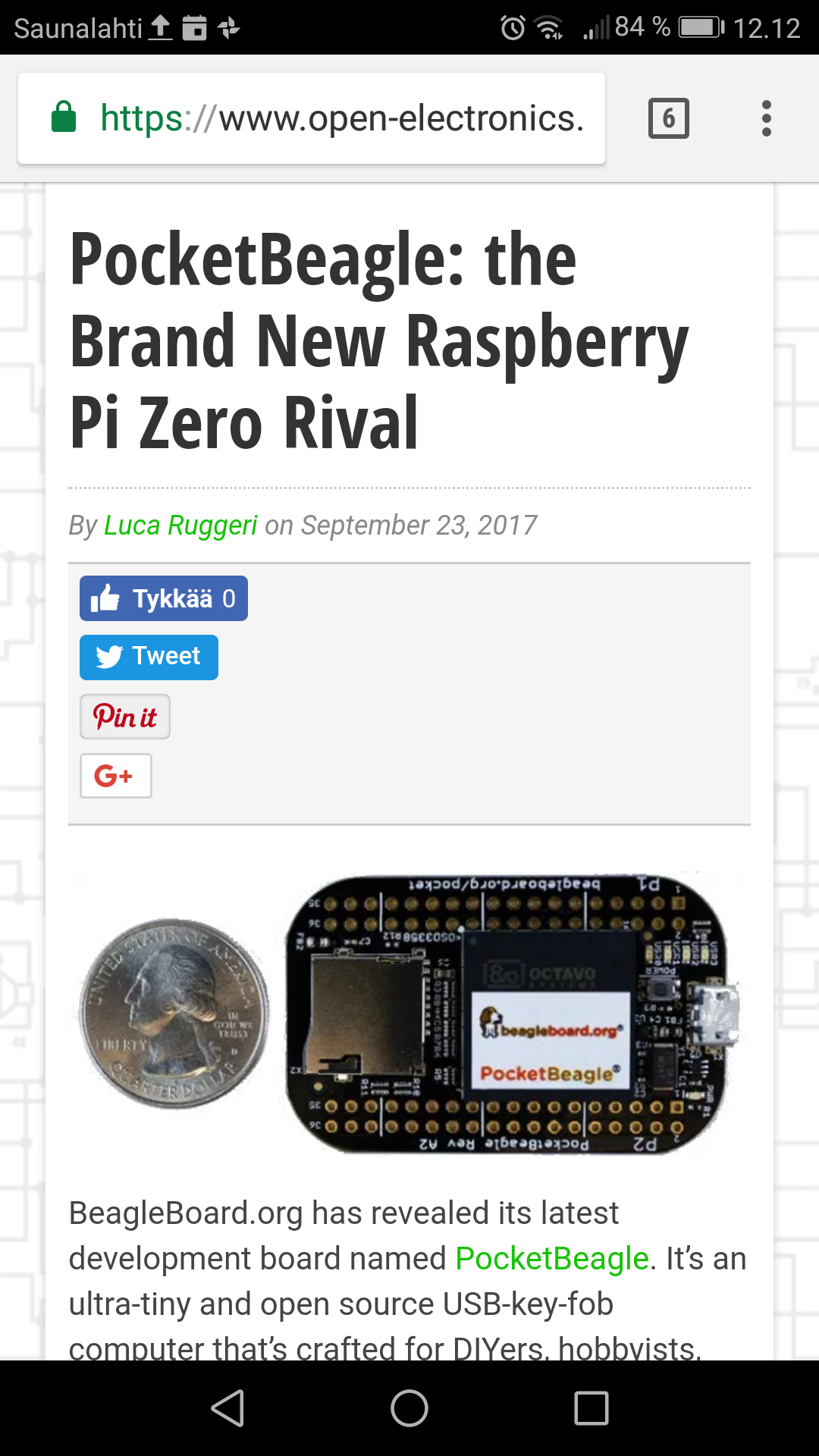https://www.open-electronics.org/pocketbeagle-the-brand-new-raspberry-pi-zero-rival/
BeagleBoard.org has revealed its latest development board named PocketBeagle. It’s an ultra-tiny and open source USB-key-fob computer that’s crafted for DIYers, hobbyists, and educators.
Talking about the dimensions, PocketBeagle measures 56x35x5mm.

9 Comments
Tomi Engdahl says:
BeagleLogic Standalone
https://hackaday.io/project/25745-beaglelogic-standalone
BeagleLogic, now as a turnkey and standalone 16-channel Logic Analyzer
Three years ago, the BeagleLogic project showed how to use a BeagleBone as a 100MSa/s, 14-channel logic analyzer.
BeagleLogic Standalone is the next step in the evolution of BeagleLogic from just an add-on to the BeagleBone to a standalone logic analyzer in itself. It is based on the OSD3358 System-In-Package (SiP) from Octavo Systems and increases the specifications to 16-channels @100MSa/s and adds Gigabit Ethernet vs. 100Mbps on the BeagleBone(s).
BeagleLogic standalone is alive and booting! Check out the project logs for more information
Tomi Engdahl says:
Maker Faire Reveal: PocketBeagle – BeagleBoard’s Newest and Smallest Computer
https://www.arrow.com/en/research-and-events/videos/pocketbeagle-maker-fair?utm_source=eloqua&utm_medium=email&utm_term=research_events&utm_content=arrow_newsletter&utm_campaign=arrow_emea_en_seo-newsletter_oct2017
PocketBeagle Technical Specifications
Texas Instruments® Sitara™ AM3358 Processor Integrated in the OSD3358-SM
512MB DDR3 800MHZ RAM (Integrated in the OSD3358-SM)
Debian GNU/Linux images customized for BeagleBone
Cloud9 IDE on Node.js w/ BoneScript library
High speed USB 2.0 OTG (host/client) micro-B connector (USB0)
Bootable microSD card slot (MMC00
TPS65217C PMIC is used along with a separate LDO to provide power to the system
55x35x5mm dimension
8 analog inputs with 6 at 1.8V and 2 at 3.3V along with 1.8V voltage references
44 digital GPIOs accessible with 18 enabled by default including 2 shared with the 3.3V analog input pins
23 programmable real-time unit (PRU) 32-bit microcontroller I/O pins
2 voltage outputs, 1 with a 3.3V LDO and 1 with switch from voltage input
Tomi Engdahl says:
https://www.arrow.com/en/research-and-events/articles/october-2017-engineering-product-picks?utm_source=eloqua&utm_medium=email&utm_term=research_events&utm_content=arrow_newsletter&utm_campaign=arrow_emea_en_seo-newsletter_oct2017
Tomi Engdahl says:
PocketBeagle® – BeagleBoard’s Smallest Single Board Computer
https://www.arrow.com/en/products/pocketbeagle/beagleboardorg
Tomi Engdahl says:
Hands on with PocketBeagle
https://hackaday.com/2017/12/07/hands-on-with-pocketbeagle/
[Ken Shirriff] is no stranger to the pages of Hackaday. His blog posts are always interesting, and the recent one talking about the PocketBeagle is no exception. If you are old enough to remember the days when a Unix workstation set you back tens of thousands of dollars, you won’t be able to help yourself marveling at a Linux computer with 45 I/O pins, 8 analog inputs, 512M of RAM, and a 1 GHz clock, that fits in your pocket and costs $25. What’s more the board’s CPU has two 200 MHz auxiliary CPUs onboard to handle I/O without having to worry about Linux overhead.
[Ken] shows a small snippet of C code that outputs a 40 MHz square wave no matter what the Linux OS is doing. In this way you can use Linux for the parts of your application that are not that critical, and use the slave processors to handle real time processing.
Hands-on with the PocketBeagle: a $25 Linux computer with lots of I/O pins
http://www.righto.com/2017/12/hands-on-with-pocketbeagle-tiny-25.html
Tomi Engdahl says:
Expand PocketBeagle Easily with Mikro click Boards: OLED C
https://www.hackster.io/beaglefriends-octavosystems/expand-pocketbeagle-easily-with-mikro-click-boards-oled-c-de7a7c
MikroElecktronika Click Boards & Device Tree Software make extending your BeagleBoard.org PocketBeagle easy! Start with the OLED C display!
Tomi Engdahl says:
Rapidly Prototype with the OSD3358
https://octavosystems.com/2018/06/20/rapidly-prototype-with-the-osd3358/
Developers can now rapidly prototype with the OSD3358 System-in-Package (SiP) using BeagleBoard.org® PocketBeagle® and MikroElektronika click boards™. This blog will describe the procedure for interfacing a new click board™ with PocketBeagle® using the OLED-C click board™ as an example
Tomi Engdahl says:
Next-Gen PocketBeagle 2 Arrives with Dual Cortex-A53 Cores and Under $30
Linux-capable SBC is a performance upgrade over the previous PocketBeagle and still fits in an Altoids tin.
https://www.hackster.io/news/next-gen-pocketbeagle-2-arrives-with-dual-cortex-a53-cores-and-under-30-b14712a2fcb2
Tomi Engdahl says:
PocketBeagle 2 SBC combines TI AM6232 dual-core Cortex-A53 SoC with MSPM0 MCU
https://www.cnx-software.com/2025/02/18/pocketbeagle-2-sbc-combines-ti-am6232-soc-with-mspm0-mcu/
Beagleboard has recently announced the PocketBeagle 2, a single board computer (SBC) built around TI’s AM6232 dual-core Cortex-A53 and Cortex-M7 SoC and an additional MSPM0L1105 Arm Cortex-M0+ microcontroller for ADC pins and board ID storage. Designed for developers, students, and hobbyists, it’s a direct upgrade from the previous generation PocketBeagle which the company released in 2017. The new board comes with a faster dual-core 64-bit CPU (compared to a single-core CPU), faster memory (DDR4), improved power management (USB-C + LiPo charger), and easier debugging (UART + JTAG) for faster development.